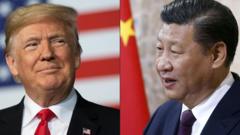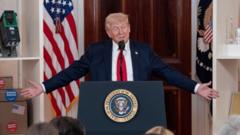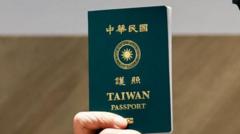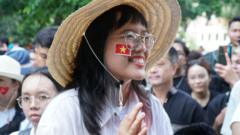China's recent launch marks a significant step in its space exploration ambitions, evoking national pride and international scrutiny.
China Launches Youngest Astronaut Crew in Historic Space Mission
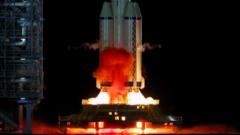
China Launches Youngest Astronaut Crew in Historic Space Mission
China's bold leap into the cosmos continues as its youngest astronauts embark on a mission to the Tiangong space station.
In a spectacular show of technological prowess, China's young astronauts, or taikonauts, embarked on their journey from the Jiuquan Satellite Launch Center in the Gobi Desert. The ground shook ahead of lift-off, lighting up the night sky with flames as the Shenzhou 19 spacecraft propelled them toward the Tiangong space station. This mission, a cornerstone of China’s space aspirations, will see these brave explorers conducting experimental research and carrying out spacewalks over the next six months.
As China gears up for potential lunar missions by 2030, President Xi Jinping's vision of transforming the nation into a space power remains a pivotal element of its national agenda. However, this rapid advancement has raised alarm bells in the United States. NASA Administrator Bill Nelson voiced concerns earlier this year about the competitive nature of space efforts, suggesting that China's movements could pose a potential threat as they eye territorial claims on the Moon.
In the town of Dongfeng Space City, there’s a palpable sense of pride surrounding the space program. Streets are adorned with vibrant decorations, featuring national flags and charming astronaut-themed sculptures, creating an environment of celebration for the send-off of these astronauts. The pilot of the Shenzhou 19, veteran Cai Xuzhe, declared that he feels invigorated by the youthful spirit of his teammates, emphasizing their commitment to achieving extraordinary feats in space exploration.
China's recent space achievements have made headlines, including the successful retrieval of lunar samples and the deployment of its Zhurong rover on Mars. With plans for a constellation of 14,000 satellites, China aims to establish robust communication networks in space, potentially rivaling the likes of SpaceX.
While some in the U.S. express increasing concerns over China's advancing capabilities, Chinese officials advocate for peaceful exploration and international collaboration. The ongoing space race, however, centers not just on scientific exploration but on controlling lunar resources, which are estimated to be worth trillions.
Chinese experts from the launch center highlight the numerous benefits of their space station experiments—research that could revolutionize health care and provide new treatments for ailments caused by aging and microgravity. Plans to establish a permanent research station on the Moon alongside further ambitious missions set the stage for a continued buildup of China's space agenda.
As China's space race progresses, the government emphasizes self-reliance and enhancement of capabilities, with staunch commitments to overcoming technological challenges. With vigilance against potential information leaks, the country remains aware that space, once the final frontier, is also the new arena for global rivalry.
In this high-stakes competition, the message is clear: the future of space exploration is unfolding, and China is determined to carve its place in the cosmos.








